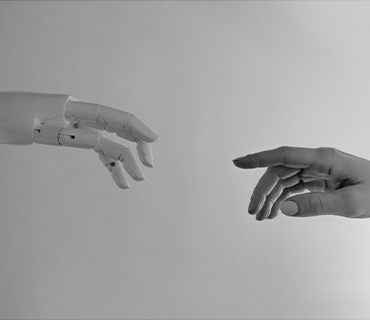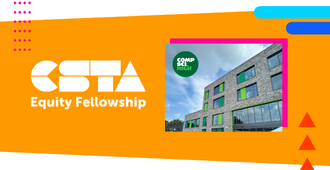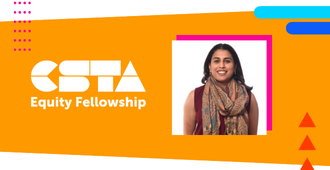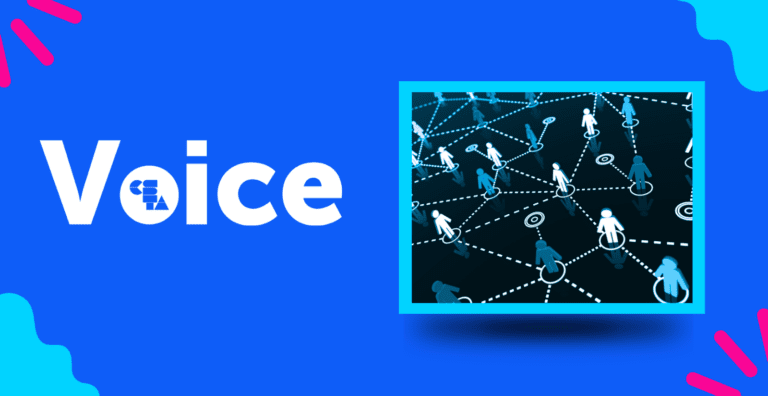Posted by CSTA Conference Committee on May 03, 2023

We have many sessions dedicated to AI during CSTA 2023; but if you’re overwhelmed and don’t know where to start, fret not! We’ve compiled a list of recommended sessions that focus on AI—what it is, how to teach it, and ways of understanding it.
Full Story
Artificial Intelligence—it’s what everyone is talking about! Whether you fear or admire it, AI is here to stay. As technology continues to evolve and become more sophisticated, it is important for computer science students to develop a deep understanding of its underlying principles and techniques. The study of AI can provide students with valuable skills and knowledge that will prepare them for a rapidly changing job market.
The CSTA annual conference is a gathering of the world’s largest computer science department to find community and further your professional development. We have many sessions dedicated to AI during CSTA 2023; but if you’re overwhelmed and don’t know where to start, fret not! We’ve compiled a list of recommended sessions that focus on AI—what it is, how to teach it, and ways of understanding it.
Make Me Happy: Machine Learning for Kids
Presented by Ryan Evans at 11 a.m. ET on July 12, our first recommended session walks through a Machine Learning for Kids activity to teach elementary students about AI creation and ethics.
Siri was released in 2010 and Alexa in 2014, which means that artificial intelligence has been present in the lives of today’s elementary students from the very beginning. It’s important for students to think critically about AI products, considering the well-being of those who will use the devices and the potential consequences of AI misuse or a flawed AI system. Machine Learning for Kids empowers students to train computers and create projects that help them understand AI and thoughtfully engage in the AI creation process. In this session, participants will be guided through a hands-on machine learning activity using the Machine Learning for Kids platform. We’ll explore ethical considerations in the AI development process and get a closer look at how computers are trained to make decisions. Participants will leave with the tools and resources to implement AI lessons in their own elementary classrooms.
How to Build Tony Stark’s JARVIS Workshop
Teerapat Pokaprakarn is presenting an engaging workshop on natural language processing using Google Dialogflow to build a chatbot. This session will take place on July 11 at 1 p.m ET.
Have you ever dreamed of creating your own version of Tony Stark’s virtual assistant, JARVIS? Do you wonder how OpenAI data scientists developed the DALL-E 2 tool that can create an image from any prompt? Do you wish you knew more about how Siri and Google Assistant work? This workshop will answer those questions and more. Participants in this hands-on coding workshop will learn about the core component of JARVIS: natural language processing (NLP), the evolutionary branch of artificial intelligence that bridges the gap between human communication and computers’ ability to understand. A virtual assistant is just one of the most familiar use cases for NLP, but many more everyday applications exist, including sentiment analysis, text classification, and speech-to-text. Next, participants will build and deploy a Google Assistant chatbot to handle everyday weather-related questions such as “What is the weather like today?” or “How is the weather in Bangkok tomorrow?” or even slightly more tricky questions like “Should I bring my umbrella?” We’ll learn how to use Google Dialogflow, a state-of-the-art tool to build chatbots and voice bots. No prior coding experience is required for this workshop, but basic knowledge of JavaScript or Python can be handy.
Dismantling the Algorithm: Equipping Students to Fight Back Against AI
Isabel Gwara will help you empower high school students to investigate and dismantle the algorithms that surround them in this workshop on July 12 at 11a.m. ET.
Explore highly engaging AI projects that empower students to investigate and dismantle the AI algorithms that surround them. In this workshop, we won’t think of algorithms as good or evil, but will instead center a mindset of inquiry, equipping students with the cognitive tools to manipulate algorithms on their own terms. Attendees will investigate projects that build real-world AI literacy: experiment with makeup and face paint to thwart facial recognition, convince your TikTok algorithm that you love water polo, and write a handbook for up-and-coming YouTube influencers. Attendees will collaborate to build a repository of AI project ideas that inspire students to hack the algorithms they encounter every day. Build a lifelong mindset of inquiry, all while covering your data, AI, and impacts of computing standards. No prior AI knowledge required, for you or your students. Leave with the tools to inspire students to navigate the complex universe of real-world AI algorithms!
DIY-AI, Do-It-Yourself: Artificial Intelligence with and without Coding
This presentation by Saul Duarte and Rudy Escobar will explore uses of AI in machine learning, the arts, and physical computing in the K-12 classroom. This session takes place on July 11 at 5:10 p.m. ET.
This presentation will explore ways to teach artificial intelligence in the K–12 classroom, with and without coding. Although the apparent complexity of AI topics can prevent teachers from incorporating it into their lesson plans, this session shares ways to integrate AI with other disciplines, including the arts, machine learning, and physical computing with block coding. We’ll help K–12 educators get started teaching about and with AI in any grade, creating rich, dynamic paths for students to gain essential technology skills. Additional resources on AI teaching will be provided.
Can You See Like A Computer? Introduction to AI Vision
This virtual AI card game, presented via poster presentation by Corey Rogers and Mike Deutsch, provides a fun and insightful intro to AI vision.
Looking for ways to make AI approachable for your students and colleagues? Come learn how a simple, fun AI card game can help students and educators draw meaningful connections among computational thinking, classroom content, and AI vision. In this session, we’ll play a few virtual rounds of the card game together and in breakout rooms, then model how to move from unplugged to plugged using Google’s Teachable Machine tool.
This activity helps kids understand how AI works and primes them to think abstractly and examine the implications of AI in their lives. For teachers, playing the game provides concrete examples of decomposition and abstraction, which in turn helps them identify computational thinking concepts present in their classroom content. Participants will leave with a printable version of the AI card game, lessons, and resources to use in their own home settings
Register for CSTA 2023
Be sure to head to the full conference program to read more about these recommendations and plan which sessions you want to attend. If you haven’t registered for the annual conference yet, head over to the CSTA 2023 Home Page to secure your spot. We hope to see you there for three days of learning and community!



